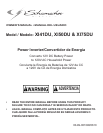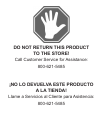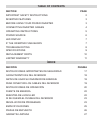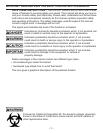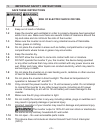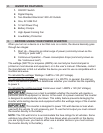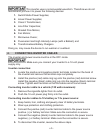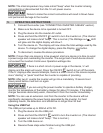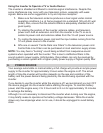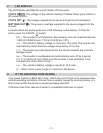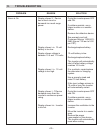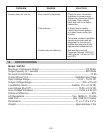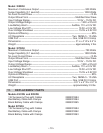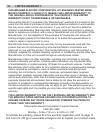
• 3 •
INVERTER FEATURES2.
ON/OFF Switch1.
Digital Display2.
Two3. Standard Electrical 120V AC Outlets
One, 5V USB Port4.
12-Volt Power Plug5.
Battery Clamps6.
High-Speed Cooling Fan7.
Low-Battery Protection8.
BEFORE USING YOUR POWER INVERTER3.
When you turn on a device or a tool that runs on a motor, the device basically goes
through two stages:
Start Up – Requiring an initial surge of power (commonly known as the 1.
“starting or peak load”).
Continuous Operation – Power consumption drops (commonly known as 2.
the “continuous load”).
The wattage (WATTS) or amperes (AMPS) can normally be found stamped or
printed on most devices and equipment, or in the user’s manual. Otherwise, contact
the manufacturer to nd out whether the device you want to use is compatible with a
modied sine wave.
To calculate the wattage: Wattage = AMPS x 120 (AC Voltage).
To calculate the starting load: Starting Load = 2 x WATTS. In general, the start up
load of the device or power tool determines whether your inverter has the capability
to power it.
To calculate the continuous load: Continuous Load = AMPS x 120 (AC Voltage).
Always run a test to establish whether the inverter will operate a
particular piece of equipment or device. In the event of a power overload, the inverter
is designed to automatically shut down. This safety feature prevents damaging the
inverter while testing devices and equipment within the wattage range of the inverter.
This inverter is designed to power 100 watt devices or less when
used with the vehicle 12 volt accessory port. To use the full output you must connect
the inverter directly to the battery.
NOTE: The 100 watt limit is to accommodate the fuse ratings for all vehicles. Some
vehicles may allow the full output. If the fuse blows when you switch on the device
you are trying to use, you have to either use a smaller device or you must connect
the inverter directly to the battery.



